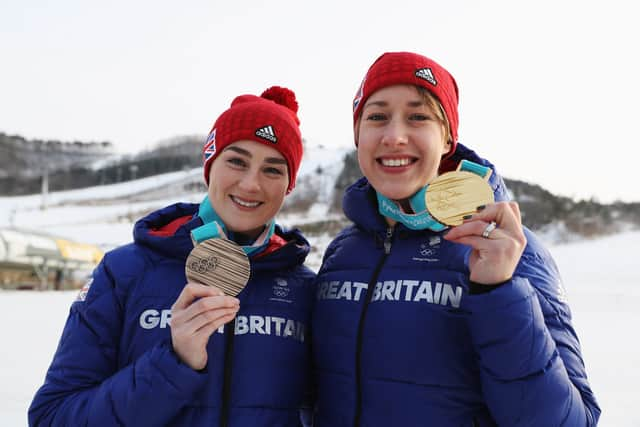Lizzy Yarnold: who is Britain’s most successful Winter Olympics athlete - and how many medals has she won?
and live on Freeview channel 276
Lizzy Yarnold will be watching on from the sidelines as part of BBC Sport’s coverage of the games just four years after she became the first British athlete to successfully defend a Winter Olympic title.
But what do we know of the most successful skeleton athlete of all-time?
Introduction to the Skeleton
Advertisement
Hide AdAdvertisement
Hide AdKent-born Yarnold was part of the Girls4Gold initiative ran by UK Sport in 2008 and was one of four athletes to join British Skeleton’s national programme.
After first competing in 2010, she claimed a first title at the Junior World Championships two years later.
That was enough to secure a place at the senior version of the competition, and she went on to finish in third place.
Speaking after her junior success, she said: “It was a tough race with a very good field but I am delighted and really, really happy that I won, especially as my parents flew out to watch and support me.
Advertisement
Hide AdAdvertisement
Hide Ad“I made a few mistakes on the second run but worked hard at the bottom section of the track to recover and I’m pleased that I managed to extend my lead and win the gold,.
“I’d like to thank Mark Wood, my coach, for all his advice and support and also the support staff that have helped me in recent weeks.”
Her third place finish in the senior World Championship also allowed her to compete as a full-time athlete.
World Cup Winner and a first taste of gold
A first World Cup title was attained in February 2014, just days before Yarnold travelled to Sochi for her first experience of the Winter Olympics.


Advertisement
Hide AdAdvertisement
Hide AdHer performance was remarkable, as she led the competition after every run and finished 0.97 seconds ahead of Noelle Pikus-Pace to secure a first gold medal.
That was only the tenth gold medal claimed by a British athletic in the history of the Winter Olympics.
“I'm just so chuffed I'm Olympic champion,” Yarnold told BBC Sport in the aftermath of the competition.
“My fourth run I was totally relaxed and enjoyed it. It was a bit of a messy one but I'm just so thrilled I got myself here after five years hard work.
Advertisement
Hide AdAdvertisement
Hide Ad“As an athlete you do so much hard work, but it's worth it for days like this.”
More success and an impressive defence
Another World Championship title and a European Championship win followed 12 months later, but Yarnold’s preparations for the 2018 Olympics were far from straightforward.


A vestibular disorder affecting her inner ear was confirmed in September 2017 and a chest infection hampered her in arrival in South Korea ahead of the games.
Despite the unfortunate set of circumstances, Yarnold made Winter Olympic history for her country by becoming the first Brit to successful defend a gold medal.
Advertisement
Hide AdAdvertisement
Hide AdSpeaking after writing her name into the history books, she reflected on a difficult time, saying: “After the first run yesterday I was almost at the point of pulling out,” said Yarnold. “My chest infection was stopping me from breathing.
“I just tried to get the second run down and then fight another day today. If it wasn’t for my physio Louise Turner telling me to go down again, I’m not sure I would be here.
“I was dizzy, I couldn’t breathe. I have no idea what happened. I’ve been ill for a week. It’s been a great week.
“We have the doctors, I have my physio Louise.
“Everyone is supporting me in helping people get here. Athletes are people too. Now I’m going to sleep for weeks. The emotions are gratitude to the whole team to get here, and relief, and exhaustion.
“And lots of crying.”
Retirement and inspiring the next generation
Advertisement
Hide AdAdvertisement
Hide AdYarnold’s defence of her Olympic title was even more remarkable after it was revealed a tumour had been found in her knee just months before the 2018 games.
That was removed weeks after her return to Britain and more operations followed after she was found to have a displaced disc in her spine.
She officially announced her retirement from competition in October 2018, but she reflected on a successful career in one of the Winter Olympics’ most dangerous sports and looked forward to collecting a OBE just days later.
She said: “I have lived out my dream and achieved far more than I ever thought possible in my 10 years in the sport.
Advertisement
Hide AdAdvertisement
Hide Ad“But it’s time to move on. I am ready for a fresh challenge.
“My two sisters and my husband are going to come with me and we are going to meet the whole family for an afternoon tea and really celebrate.”
Yarnold has recently been re-elected to the British Olympic Association’s Athlete Commission and continues to act as a mentor for youth athletes around the country.
Comment Guidelines
National World encourages reader discussion on our stories. User feedback, insights and back-and-forth exchanges add a rich layer of context to reporting. Please review our Community Guidelines before commenting.